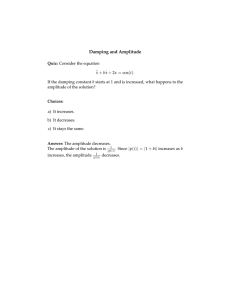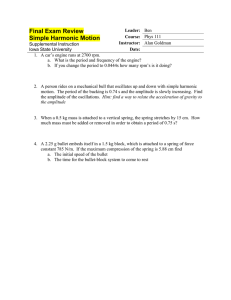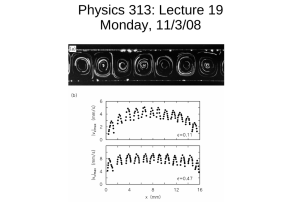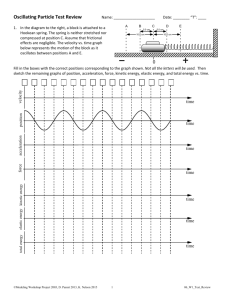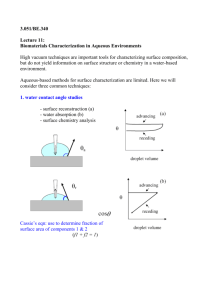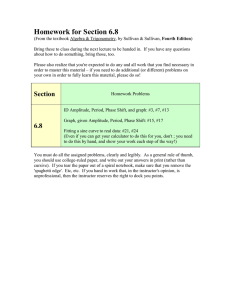Dynamic Atomic Force Microscopy: Basic Concepts
advertisement
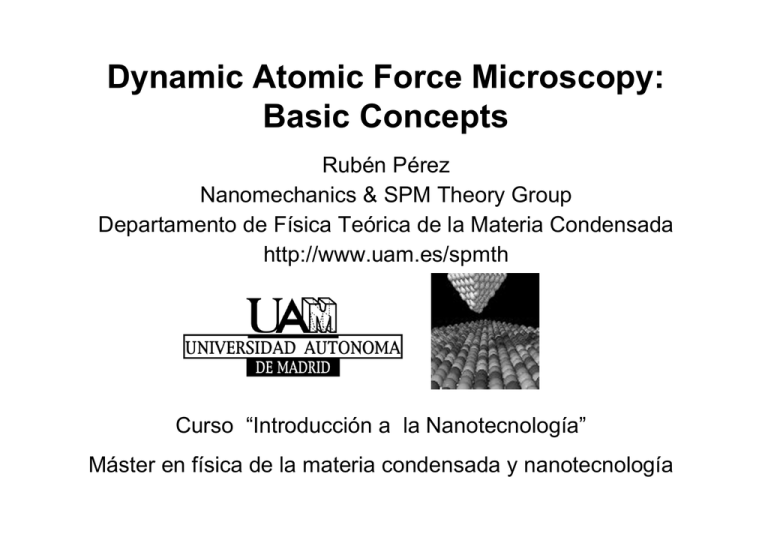
Dynamic Atomic Force Microscopy: Basic Concepts Rubén Pérez Nanomechanics & SPM Theory Group Departamento de Física Teórica de la Materia Condensada http://www.uam.es/spmth Curso “Introducción a la Nanotecnología” Máster en física de la materia condensada y nanotecnología References R. García and R. Pérez, Surf. Sci. Rep. 47, 197 (2002) F.J. Giessibl, Rev. Mod. Phys. 75, 949 (2003) W. Hofer, A.S. Foster & A. Shluger , Rev. Mod. Phys. 75, 1287 (2003) • • • C. J. Chen. “Introduction to Scanning Tunneling Microscopy”. 2nd Edition. (Oxford University Press, Oxford, 2008). S. Morita, R. Wiesendanger, E. Meyer (Eds). “Noncontact Atomic Force Microscopy”. (Springer, Berlin, 2002). S. Morita, F.J. Giessibl R. Wiesendanger (Eds). “Noncontact Atomic Force Microscopy”. Vol. 2 (Springer, Berlin, 2009). Outline • Static vs Dynamic AFM: AM-AFM & FM-AFM. • Amplitude Modulation AFM • Frequency Modulation AFM Static vs Dynamic AFM: Amplitude Modulation (AM) & Frequency Modulation (FM). ATOMIC FORCE MICROSCOPY (AFM) G. Binnig, C. Gerber & C. Quate, PRL 56 (1986) 930 2nd most cited PRL: +5000 citations !!! http://monet.physik.unibas.ch/famars/afm_prin.htm AM-AFM Fixed excitation frequency constant oscillation amplitude Cantilever Piezo oscillator Electronics and feedback: constant amplitude Tip Sample Scanner Piezo XYZ Computer and display 5 m Limitations of static AFM Contact F Deformation, Friction No point defects observed Atomic Resolution? Non-contact F Detection of small forces: soft cantilevers. “Jump to contact” : stiff cantilevers AFM: G. Binnig, C. Gerber & C. Quate, PRL 56 (1986) 930 Dynamic AFM http://monet.physik.unibas.ch/famars/afm_prin.htm Dynamic AFM: Our Goal Why changes observed in the dynamic properties of a vibrating cantilever with a tip that interacts with a surface make possible to: AM-dAFM • Obtain molecular resolution images of biological samples in ambient conditions. •Resolve atomic-scale defects in UHV. FM-dAFM R. García and R. Pérez, Surf. Sci. Rep. 47, 197 (2002) Dynamic description Cantilever-tip ensemble as a point mass spring described by a nonlinear 2nd order differential equation Amplitude Resonance Frequency Phase shift link the dynamics of a vibrating tip to the tip-surface Fts interaction. Why do A and f () depend on Fts? (simple quasi-harmonic argument) -kz Fts For small amplitudes and large distances New new resonance curve New amplitude for given exc BUT: Large amplitudes Force gradient varies considerably during oscillation Non-linear features in the dynamics Two major modes: AM-AFM and FM-AFM Amplitude Modulation AFM • • • • Excitation with constant amplitude Aexc and frequency exc close or at its FREE resonance frequency 0. Oscillation amplitude A as feedback for topography. Phase shift between excitation and oscillation: compositional contrast. Air and liquid environments. Y. Martin et al, JAP 61, 4723 (1987) Q. Zhong et al, SS 290, L688 (1993) Frequency Modulation AFM • • • • Constant oscillation amplitude at the current resonance frequency (depends on Fts). Frequency shift f as feedback for topography. Excitation amplitude Aexc provides atomic-scale information on dissipation. UHV (now also liquids !) T.R. Albrecht et al, JAP 69, 668 (1987) F.J. Giessibl, Science 267, 68 (1995) Amplitude Modulation (AM) AFM Outline: AM-AFM (or Tapping mode AFM) • Operation Parameters. • Non-linear dynamics: Existence of two oscillation states (L & H): implications for imaging. • Understanding amplitude reduction. • Imaging materials properties: phase shifts and dissipation. • Summary: things to remember... Laboratorio de Fuerzas y Túnel Forces in AFM Restoring force cantilever Fc=-kz Force (nN) 40 0 PM -40 van der Waals forces ts -80 0 2 4 6 8 10 Separation (nm) Excitation force F0cos t Capillary forces Hidrodynamic forces Adhesion forces Fa=4R Short range repulsive forces (DMT) Instituto de Microelectrónica de Madrid Forced damped harmonic oscillator Q Quality factor (cantilever damping) (transient) 0=exc A = QAexc (resonance) BUT Fts is nonlinear anharmonic effects EXPERIMENT Silicon, A0=15 nm, A=13 nm, f0=295.64 kHz Low to high high to low SIMULATION R= 10 nm, A0=10 nm, zc=8 nm, E=1 GPa, k=40 N/m, f0=325 kHz AM-AFM: Two stable oscillation states (two steady state solutions) Aexc = 10 nm Aset H: high amplitude state L: low amplitude state Amplitude curves: AH(L) vs zc • Collection of L and H solutions gives rise to L and H branches. • AH(L) decreases linearly with zc for both branches. •Ambiguity in the operation: both branches can match the set amplitude Aset . Experimental implications of the coexistence of states (I): Noise and stability Sample: InAs quantum dots Amplitude (nm) 18 A1 L 15 12 A2 H A3 9 6 6 9 12 15 18 21 24 z piezo displacement (nm) 40 nm A1 low amplitude branch A2 A3 high amplitude branch García, San Paulo, PRB 61, R13381 (2000) Are both solutions equally accessible ? Phase space diagrams: Representation of the tip final state as a function of the initial velocity and positions García and San Paulo, Phys. Rev. B 61, R13381 (2000) Zc=16 nm Zc=14.5 nm Zc=7.5 nm V/A0ω Z/A0 Phase space dominated by the L state=stable operation Phase space diagram with significant H and L contributions=unstable operation Tip should stay always on the same branch (deterministic) BUT… Phase space diagram dominated by the H state basin of attraction=stable operation NOISE: Implications for scanning Mechanical, electronical,thermal and feedback perturbations... Vscan Finite time response of the feedback ( 10-4 s) Change in separation can lead to transitions before the feedback takes over • AM-AFM would operate properly if initial (unperturbed) and intermediate state belong to the same branch, otherwise instabilities and image artifacts will appear. • Stable operation when one of the states dominates the phase space (tip oscillates in the state with the largest attraction basin). H and L states have different properties Amplitude (nm) Characterizing the physical properties of the two states.... 10 (a) 8 6 4 2 High amplitude solution Low amplitude solution 0 <Fint> (nN) 1.0 (b) 0.5 0.0 -0.5 Simulation data: R=20 nm f0=350 kHz, Q=400, H=6.4x10-20, E*=1.52 GPa Contact time -1.0 1.0 (c) 0.5 0.0 0 2 4 6 8 10 12 Tip-surface separation (nm) García, Pérez, Surf. Sci. Rep. 47, 197 (2002) Does resolution depend on the oscillation state chosen? Morphology and dimensions of fragments clearly resolved L state H state No domain structure Irreversible deformation after imaging on H state a-HSA antibody on mica Analytical Approximations (Understanding the amplitude reduction…: related to Fts??) San Paulo and García, PRB 64, 193411 (2001) The virial theorem and energy consideration allows to derive an analytical approximation ω=ω0 and A>>z0 Negligible power dissipation Phase Imaging The dynamic response of the cantilever is modified by the tip-surface interactions Piezo oscillator Driving signal: F(t) = F0cos(t) Cantilever response: z(t) = z0+ Acos(t-) SAMPLE Polymers: Morphology and Structure Amplitude image Polymer morphology and structure as a function of temperature. Hydrogenated diblock copolymer (PEO-PB). Crystallisation of PEO blocks occurs individually for each sphere (light are crystalline, dark amorphous). Reiter et al., Phys. Rev. Lett. 87, 2261 (2001) Phase image Phase Image, size 1m2 PHASE SHIFT AND ENERGY DISSIPATION IN AMPLITUDE MODULATIONAFM Steady solution z(t) A() cos(t ) Dynamic equilibrium in AM -AFM (tapping mode) E EXT E med E dis Cleveland et al. APL 72, 2613(1998) Tamayo, García APL73, 2926 (1998) García et al. Surf. Int. Anal. 27, 1999) energy per period At Asp=constant phase shifts are linked to tip-surface inelastic interactions CONTRIBUTIONS TO CONTRAST IN PHASE IMAGES TOPOGRAPHIC EFFECTS ELASTIC CONTRIBUTIONS TAPPING NON CONTACT TRANSITIONS YOUNG MODULUS (In presence of dissipative channels) PHASE CONTRAST VISCOELASTICITY ADHESION HYSTERESIS INELASTIC CONTRIBUTIONS CAPILLARY FORCES HIDROPHILIC/HIDROPHOBIC INTERACTIONS Continuous Model for the Cantilever w(x,t) zc z d(x,t) Rodríguez and García, Appl. Phys. Lett. 80, 1646 (2002) x 10 m H.A. (continous) L.A. (continous) H.A. (point-mass) L.A. (pont-mass) 15 LA 15 0 w ( x=1,t ) (nm) amplitude (nm) 20 10 5 zc -15 HA 15 0 -15 0 0 5 10 15 20 0 time ( s) 15 tip-sample distance (nm) 0 1x10 low amplitude -4 8x10 -4 4x10 0 0 1x100 2 4 6 8 10 2 4 6 8 12 (b) high amplitude -4 8x10 -4 4x10 0 0 (a) 10 12 frequency (normalized to 350.6 kHz) normalized amplitude normalized amplitude Point -mass model Experimental results (Triangular cantilever) Continous model 1x100 low amplitude -4 8x10 (a) low amplitude -4 4x10 0 0 0 1x10 2 4 6 8 10 high amplitude 8x10-4 12 (b) high amplitude -4 4x10 0 0 2 4 6 8 10 12 frequency (normalized to 350.6 kHz) Parámetros de la simulación: f0,= 350.6 kHz k= 40 N/m, A0= 18.22 nm Q= 400 (masa puntual, ajusta el primer modo libre). l=119 m, h=3.6 m, b=33 m, E=170 Gpa,rc =2320 kg/m3, F=1.85 nN, a0=1.28·10-3 kg/m·s, a1=0.2 ns,a2=10.037 (modelo continuo que ajusta la curva A vs. f experimental libre) R=30 nm, H= 6.4·10-20 J, E*=1.51 Gpa, d0= 0.165 nm Stark et al. APL 77, 3293 (2000) Bimodal FM-AFM on Antibodies(IgM) Noninvasive Protein Structural Flexibility Mapping D. Martinez et al, PRL106, 198101(2011) AM-AFM: Things to remember... • Operation Parameters (OP): Aexc, exc, zc.& Aset • Two stable oscillation states: L (H) = low (large) amplitude. • Chose OP to ensure that one state dominates phase space stable imaging. • Image soft materials with L state (avoid damage). • Image stiff materials with H state (improved contrast). • Amplitude reduction related to Fts·z. • Imaging material properties: Phase imaging. • Phase shift related to Ptsdiss= Fts·dz/dt. • Nanometric resolution (both amplitude and phase images). Frequency Modulation (FM) AFM Outline: FM-AFM • Dynamic AFM: AM-AFM vs FM-AFM. • Cantilever dynamics: f vs Fts. Perturbation theory for the frequency shifts Normalized frequency shift • Atomic scale contrast and Fts: tip as the key player. • Separation of long- and short-range interactions. • semiconductors, alkali halides, oxides, metals, nanotubes,… • Recent developments. Tuning forks: small amplitudes to enhance atomic contrast Force spectroscopy: Chemical identification. Single-atom manipulation, atomic-scale magnetic imaging Operation in liquids • Summary: things to remember... 1. Dynamic AFM: AM-AFM vs FM-AFM. Two major modes: AM-AFM and FM-AFM Amplitude Modulation AFM • • • • Excitation with constant amplitude Aexc and frequency exc close or at its FREE resonance frequency 0. Oscillation amplitude A as feedback for topography. Phase shift between excitation and oscillation: compositional contrast. Air and liquid environments. Y. Martin et al, JAP 61, 4723 (1987) Q. Zhong et al, SS 290, L688 (1993) Frequency Modulation AFM • • • • Constant oscillation amplitude at the current resonance frequency (depends on Fts). Frequency shift f as feedback for topography. Excitation amplitude Aexc provides atomic-scale information on dissipation. UHV (now also liquids !) T.R. Albrecht et al, JAP 69, 668 (1987) F.J. Giessibl, Science 267, 68 (1995) Why not AM-AFM in UHV?: transient terms!! Increase Q to improve resolution BUT... Q and B (bandwidth) linked in AM-AFM (transient) Q (air) = 102 –103 small Q (UHV) = 104 –105 large (Q=50000, 0=50 kHz = 2 s !!!) We have to wait 2 s to record a single pixel... (small bandwidth) AM-AFM vs FM-AFM set-ups Aexc ,exc (constant) A FM-AFM: cantilever regulated by electronics stable and fast response. Mechanical Stability Conditions Atomic resolution in FM-AFM:Si(111)-7x7 AFM STM faulted half unfaulted half 12 adatoms 6 rest atoms F.J. Giessibl, Science 267, 68 (1995) corner hole dimers “Classical” FM-AFM operation conditions Stability Conditions k ~ 30 N/m kA0 ~ 600 nN >> Fts ~ 1-10 nN f0 ~ 100 kHz (prevents cantilever instabilities) Q ~ 30000 A0 ~ 200 Å f ~ -(50-100) Hz 1/2kA02 ~ 3.75 x 104 eV >> Ets (stable oscillation amplitudes) FM-AFM: Contrast sources Aexc f: frequency shift f It Aexc: damping (excitation) It: mean tunneling current It f Aexc 2. Cantilever dynamics : relation between the frequency shift and tip-sample interaction. Contrast source: frequency shift vs Fts f Electronics cancels damping exactly 2A z0 d Perturbation theory F.J. Giessibl, PRB 58, 10835 (1998) V(z)=kz2/2 + Vts(z) E Confirmed by numerical simulations including the control electronics d z0 d+2A M. Gauthier, R.P., T. Arai, M. Tomitori & M. Tsukada, PRL 87, 096801 (2001) Normalized frequency shift extracts the intrinsic contribution coming from Fts (Si tip on Graphite) Not accurate for small tipsample distances (2-3 Å) !! 3. Atomic-scale contrast and tipsample interaction: tip as the key player • Separation of LR and SR interactions • Semiconductors • Alkali halides & oxides • Metals, weakly bonded systems & carbonbased materials (graphite, nanotubes, …) Tip-sample Interaction: FV + FvdW + Fchem Fchem wfs overlap Sensitivity to Short-Range Forces? Exp: A = 340 Å !!!, R = 40 Å Weak singularity at turning points !!!! Characterizing the “macroscopic” tip: Separation of interactions Si tip on Cu(111) M. Guggisberg et al, PRB 61 (2000) 11151 Electrostatic VdW Computational approaches for SR Fts OK for ionic bonding Weakly bonded systems?? Necessary for covalent and metallic bonding (semiconductors and metals.) Role of SR Covalent Bonding Interactions? DFT-GGA plane wave pseudopotential calculations Charge density difference between tips Si tips d=5Å R. P. et al, PRL 78, 678 (1997) R. P. et al, PRB 58, 10 835 (1998) tip+surface – (tip +surface) Charge acumulates in the adatom dangling bond Atomic scale contrast in reactive semiconductor surfaces: chemical tip-surface interaction (between dangling bonds) Contrast dependence on tip preparation T. Uchihashi et al, PRB 56, 9834 (1997) Force-distance curves & Atomic relaxations R. P. et al, PRB 58, 10835 (1998) atomic relaxations due to tip-surface interactions!! Force vs distance curves prediction for f vs distance Comparison between theory and lowtemperature FM-AFM experiments M. Lantz et al, PRL 84, 2642 (2000) M. Lantz et al, Science 291, 2580 (2001) faulted half unfaulted half Separation of VdW and chemical interaction: substracting the corner hole contribution. Tip-surface interactions R. Pérez et al , PRL 78, 678 (1997) R. Pérez et al , PRB 58, 10835 (1998) 4. Recent developments… • Tuning forks: small amplitudes to enhance atomic contrast. • Force spectroscopy: Chemical identification • Single-atom manipulation at RT • AFM detection of spin •True atomic resolution in liquids Other operating conditions: qPlus sensor Smallest Noise for Å-size amplitudes!!! qPlus sensor made from a tuning fork (k ~ 2000 N/m) Operating under repulsive SR forces (stabilize by LR electrostatics) !!! F.J. Giessibl et al, Science 289 (2000) 422 The Chemical Structure of a Molecule Resolved by Atomic Force Microscopy L. Gross et al, Science 325, 1110 (2009) Dynamic Force Spectroscopy: Access to Fts Ad2 Ad1 Re1 Ad2 Ad1 H3 Ad2 Ad1 Inversion algorithms U. Durig, APL 76, 1203 (2000) F.J. Giessibl, APL 78, 123 (2001) J. E. Sader & S. P. Jarvis, APL 84, 1801 (2004). SR forces amenable to ab initio calculations Developments based in Force Spectroscopy Ad2 Ad1 Ad1 Re1 Re2 H3 Ad2 Ad2 Ad1 1. DISSIPATION: Characterizing the tip structure and identifying a dissipation channel due to single atomic contact adhesion. N. Oyabu et al. Phys. Rev. Lett. 96, 106101 (2006). 2. IMAGING: changes in topography: access to the real surface structure? Y. Sugimoto et al Phys. Rev. B 73, 205329 (2006). -6.3 fNm -7.3 fNm -8.4 fNm 3. CHEMICAL IDENTIFICATION: based on the relative interaction ratio of the maximum attractive force measured by dynamic force spectroscopy Y. Sugimoto et al Nature 446, 64 (2007). Magnetic exchange force microscopy with atomic resolution U. Kaiser, A. Schwarz & R. Wiesendanger, Nature 446, 522 (2007) High-Resolution FM-AFM Imaging in Liquid True Atomic Resolution (2005) True Molecular Resolution (2005) FM-AFM Image of Mica in Water Polydiacetylene Single Crystal in Water 1 nm 1 nm Cleaved Mica Surface Fukuma et al. APL 87 (2005) 034101 bc-plane of Polydiacetylene Crystal 0.5 nm Fukuma et al. APL 86 (2005) 193108 FM-AFM: Things to remember... • Frequency shift as the contrast source. • True atomic resolution. (UHV & Liquids !!!) • self-driven oscillator: More complicated operation and electronics, but simpler behaviour (amplitude feedback “linearizes” the behaviour). • Short-range (chemical, electrostatic) interactions are responsible for the atomic resolution. • Separation of interactions + inversion formulae spectroscopic capabilities (in combination with theory). • Different channels (frequency shift, tunneling currents, energy dissipation) recorded simultaneously
